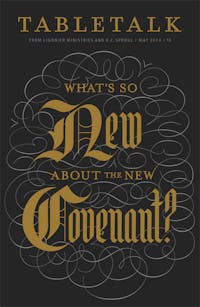
Request your free, three-month trial to Tabletalk magazine. You’ll receive the print issue monthly and gain immediate digital access to decades of archives. This trial is risk-free. No credit card required.
Try Tabletalk NowAlready receive Tabletalk magazine every month?
Verify your email address to gain unlimited access.
We are, I believe, dispensationalists by nature. That is, dispensationalism has so dominated the evangelical church over the past one hundred years, boldly and faithfully standing on the inerrancy of the Word of God when so many turned their backs, that it has become the dominant wing of the evangelical church. Bible colleges and study Bibles strategically spread its message and, in turn, its eschatology (doctrine of the last things). Its tendency to emphasize the power of Satan in the last days has meshed well with an increasingly secularized West. It has become the water we swim in.
Dispensational doctrine tends to emphasize the differences between the old covenant and the new. The temptation among those who take a more covenantal approach to the question is to de-emphasize the differences. My dispensational friends are wont to drive a wedge between the Old and New Testaments. My covenantal friends are wont to tear out the pages that separate them. Make the first mistake and you denigrate the work of God prior to the advent of Christ and reduce your Bible by more than half. Make the second mistake and you denigrate the greatness of the work of Christ.
The solution, of course, is to agree with all the Bible, which affirms both that God was at work well before the announcement to Zechariah (Luke 1:5–25), and that John the Baptist, along with Jesus, came with a radical message. The difference: the kingdom of God was at hand. John the Forerunner certainly knew that things had changed. For centuries up to that point, baptism was a ritual by which those who were not Abraham’s descendents were numbered among the people of God. Now, however, John was proclaiming that even the Jews must be baptized. Why? Because the kingdom was at hand. The ax was being laid to the root of the tree. The winnowing fork was in hand.
Jesus, in turn, preached the same. The first account we have of Jesus preaching recounts how He read this promise of a new age to come: “The Spirit of the Lord is upon me, because he has anointed me to proclaim good news to the poor. He has sent me to proclaim liberty to the captives and recovering of sight to the blind, to set at liberty those who are oppressed, to proclaim the year of the Lord’s favor” (Luke 4:18–19). Reading the promise wasn’t the great watershed, however, but what He said afterward: “Today this Scripture is fulfilled in your hearing” (v. 21).
Under the old covenant, people came to have peace with God in the same way we have peace with God. That is, they trusted in the work of Christ that from their vantage point was still to come. They, not knowing exactly how God would bring it to pass, cried out, “Lord, be merciful to me, a sinner.” In our context, it is the same faith in the same object. We have peace with God by trusting in the once-for-all finished work of Christ. It is, of course, a great and glorious change in the new covenant that this event has come to pass in space and time. It is likewise a great thing that under the new covenant, we have so much more understanding and revelation of the means by which God redeems us. I can’t imagine how much more difficult it must have been to live in a world of types and shadows. This means we must give thanks for living in light of light.
There is, of course, yet another great change: the giving of the Spirit in power to all those who have been blessed to believe. That power, and its purpose, however, relates deeply to the great change. With the fall of man in the garden, what God had designed was swept into chaos and decay. The perfect world, which just days before God Himself had declared “good,” and the stewards over the creation were now corrupted. Sin opened a Pandora’s box of entropy—physical, spiritual, and cosmological. Every instance of God’s giving grace in the old covenant—the covering of Adam and Eve, the deliverance of Noah and family, the calling of Abraham out of Ur of the Chaldees, the rescuing of His people from the boot of Pharaoh, the judges, the godly kings—was given in a context of fits and starts, each designed to fall short and to point to what was to come.
The kingdom we now seek is His kingdom, which shall have no end. We need have no fear that our King has feet of clay. We need not despair that His strong right arm will come up short of the task. When Jesus walked out of His tomb as the firstborn of the new creation, that downward spiral came to an end. His resurrection did not merely signal a counterattack. It was not just the establishment of a beachhead. It was not just a crucial success in a war whose outcome is unsure. It was victory.
To be sure, we have much yet to mop up. He is still bringing all things under subjection. But in principle, we are of good cheer, for He has already overcome the world. Seek this kingdom—because it has come. Seek this kingdom—because it is covering the world as the water covers the sea. He is risen. That changes everything.
